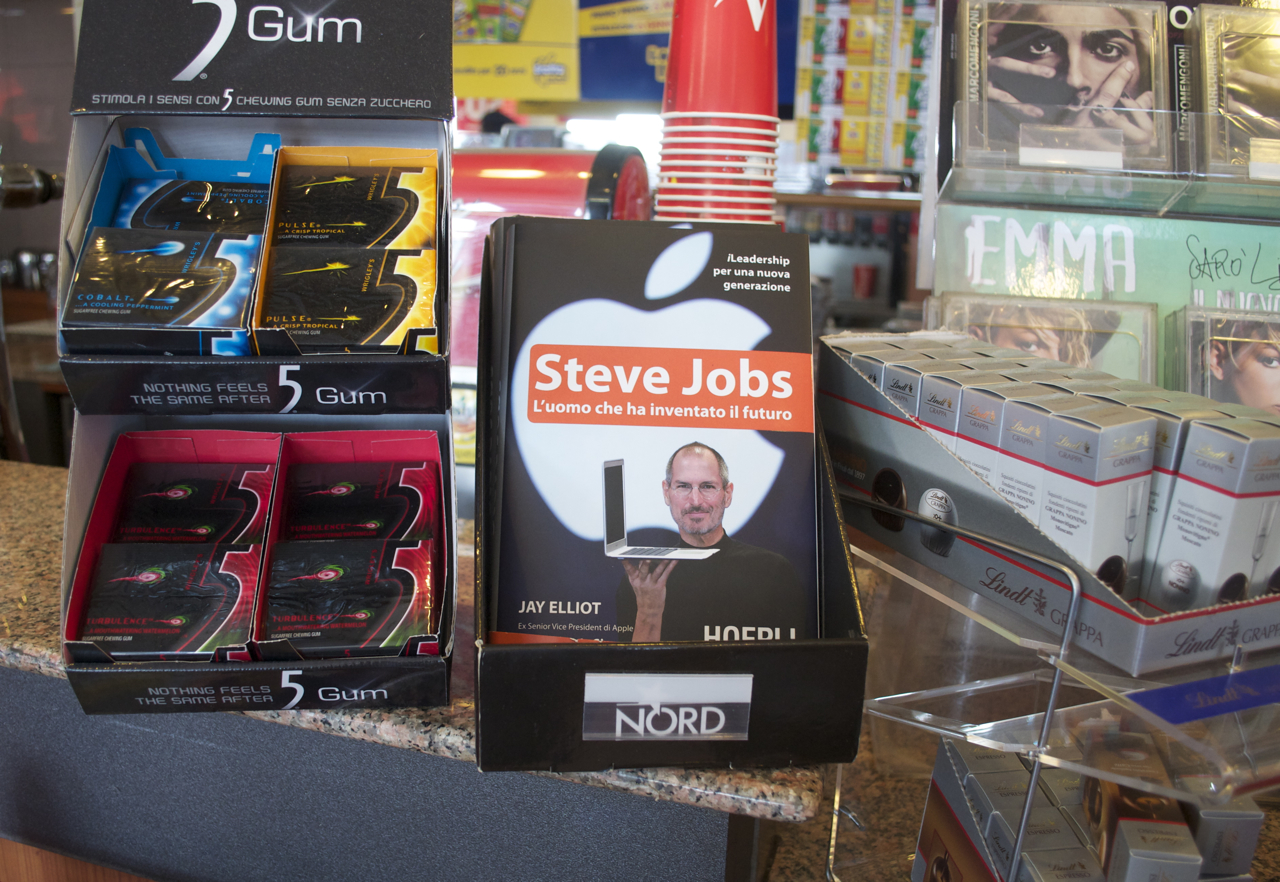Cancer sucks. I, too, mourn the passing of Steve Jobs. Not to mention a few notable, world changing people who passed away the same week as Apple’s co-founder. I too appreciate the contributions to technology and design he made. Jobs sold things that people did not even know they needed until they held them. And yes, I am typing this on my own MacBook. It is, in part, due to this shock, that I have felt compelled to note the following.
The Response
I first learned of Jobs’ passing when expressions of mourning overtook my Facebook feed. In the modern day version of rending garments or cutting hair, many of my friends changed their profile pictures to frowning finder emoticons, rainbow hued apples, and the visage of Steve Jobs. Some posted inspirational quotations—his declarations to love one’s work and to seize the day because life is short and precious. Others posted Apple-hued memories, noting how Jobs’s own meagre beginnings in the family garage inspired them to start their businesses, or how the technology he helped bring into the world facilitated their scholarly and artistic projects. Beginning her entry, ‘What would Steve Jobs do?’, Susie Bright praised Steve Jobs and the Mac for the birth of On Our Backs, the first magazine of erotica made for and by women. ‘For authors, artists, and publishing outlaws of every description, the Mac revolution was the puzzle piece we had pressed for, longed for, and finally achieved.’
In some ways, the flood of appreciation I witnessed is not surprising. I am friends with people in the technology industry (full disclosure: my brother works for Apple and is a brilliant, happy and devoted employee) and, like Jobs, I’m a Reed College dropout. This means I’m part of a community that has enjoyed ties with Jobs. At university, my first essays ever written on a computer were written on the Macs he donated to our computer lab. Jobs’ iconoclastic spirit is something I see as deeply felt by this community (that thankfully embraces its dropouts.)
iNarratives
But in other ways, the apparently extreme devotion discomfited me. The declarations of how he changed the world and made it better for us all seemed to neglect a still operative digital divide, and the recent accusation regarding the outsourcing of labour and resources. Chinese workers assembling iPads were said to work under appalling conditions, and the factory Foxconn had witnessed a rise in worker suicides. An Amnesty International report claimed that Apple (among other technology companies) procured conflict minerals for their components, trading with mining firms that were reported to perpetuate the conflict in the DRC. Meanwhile, the company was not beyond actively shutting down apps designed to critically reflect on these corporate practices.
This is not to say Jobs or Apple were unique in this regard, but that in these cases, it is hard to see how he was ‘Think[ing] Different’.
The memorial testimonies hinted at a neoliberal sentiment. They celebrated Jobs as a forward thinking individualist, a lone visionary whose success was measured in the market. And they told their own tales of self-actualisation realised in private enterprise. Everything about Jobs and Apple seemed to advance the ‘I’ or rather, the ‘i’ as Apple promoted a David versus Goliath narrative. This corporate mythology that may have been lodged in a design philosophy of attention to detail and ‘passion’ (as one Apple employee patiently explained to me) versus large-scale mediocrity in perpetual beta and copycats, but it extended to a conviction that somehow Apple was different, special, and somehow the underdog in all matters.
It was about the individual versus the mass, whether of corporation, crowdsourcing—which Jobs (ok, possibly rightly) loathed, or collective bargaining. Apparently Jobs declared unionisation to be ‘off the charts crazy’. He didn’t appear to be a fan of taxes, either, as the company had evaded paying taxes on its international profits and was seeking tax amnesty. Although Jobs’ technology could provide wonderful resources for communication (the iPad was seen to help people on the Autism spectrum) it is also notoriously isolating: iPods allow people to withdraw from crowds; texters prove among the most aggravating pedestrians, people privilege their iPhones over present company.
But to talk about this seemed to enrage people. One friend lost Facebook friends for her posts. Those of us who questioned the outpouring of devotion—not the mourning, but its intensity—were faced with angry defences that declared we did not grasp Jobs’ genius or his inspiration. His charisma was so strong, it was as though he were Lenin, or Mao. We were ‘haters’ as one Apple employee told me when I mentioned the app ban. Jobs was more than a CEO, they protested. And in this, I am agreed. All people are more than one thing. But he was still once a CEO of a company that engaged in the very same questionable corporate practices as other companies that challenge economic justice—the subject of demonstrations on Wall Street and across the U.S.
What could account for this impassioned defence? Was it an addiction to or love for the gorgeous gadgets? Was it a cult of personality? Is it that to realise Jobs and Apple are not different is to realise that far more change is needed? Is it that it is, in fact, easier to envision the end of the world than to imagine the end of capitalism?
Jobs Worship and Economic Justice
Occupy Wall Street has been in my consciousness and in my Facebook feed. I have been delighted by the growing expressions of and interest in economic justice, particularly in the U.S. context where so many public services (health, education) are privatised and poverty is treated as a matter of laziness and misfortune rather than a result of systemic practices that could be remedied through policy change. For the past three weeks, I have followed the reports, appreciating that technology has enabled the campaign to gain momentum and attention in light of an early media blackout, biased reportage and dismissal.
We Are the 99 Percent has offered a powerful site for testimony as people post their photos and stories of debilitating debt due to health care costs, education fees, and house payments made never-ending thanks to fees and interest rates. These are the people deeply affected by the financial crises, but unlike the banks they still owe, they have received no bailout or assistance. I am heartened to see more reportage these days; but even Paul Krugman’s thoughtful editorial must be countered with stories that aim to show the protests as a problem.
But even with this momentum, I still see the naysayers and the doubters. How much does such resistance owe to the powerful narratives that have served corporations for so long? In the case of Jobs worship—the memorials and the defence—one can see a willingness to embrace the mythology of corporation as underdog, or as entity whose logic reigns supreme. One can see the willingness to embrace the efficiency and power of the private enterprise and individual. One can see the willingness to draw a veil over the distant (and not so distant) practices that harm so many.
I do not blame people for mourning the passing of Steve Jobs. Nor do I dismiss his contributions to technology and design, or what he personally meant to his family. After all, as Gawker recently noted, a man so great should be able to withstand the critiques. But I do want to call attention to the corporate narratives that inhabit and shape our worldview, that make us think resistance is unnecessary, if not futile.
Part 2 of a series on Apple’s co-founder. Photograph courtesy of Jennifer Crakow.






THANK YOU for writing this. I posted something along these lines on facebook last week, and got a very similar response. So nice to see an intelligent explanation of a balanced view on his impact. It’s been amazing how many people, normally iconoclastic and/or liberal, leave their critical thinking at the door when it came to this man and his company and products.